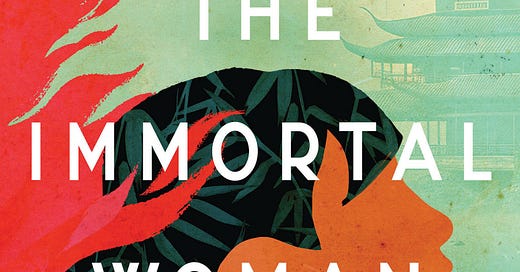Beginning in 1960s China, The Immortal Woman spans decades and generations of a Shanghai-based family. It explores the damaging consequences, and tragic outcomes of communist governmental control for one family and explores the choices people make to survive. Lemei is a high school student who reluctantly becomes a Red Guard despite her strong reservations. Her father has recently died as a political prisoner, so she decides to create the appearance of agreeing with the government in a bid for survival. After graduation, she waits for her government-assigned position and is assigned to a position as a journalist, forced to contribute to the propaganda machine. During the Tiananmen Square protests, she is involved in a brutal and life-altering act of violence. After this, Lemei loses all hope for her daughter, Lin’s future in China, and encourages her to seek a new life in the United States.
After high school, Lin goes to the US for university, intending to become a true Westerner. She erases her birth identity and refuses to be friends with other members of the Chinese expat community, including Dali, who she attended high school with. Later, she pursues relationships with white men but cannot escape the painful reminders of her difficult childhood, her mother’s struggles with mental health brought on by terrible events, and the difficult pressures of living in a communist country.
When Lin graduates from university, Lemei discovers the reality of the American dream, and how much of an illusion it is. Lemei and Lin are then locked in a conflict of wills. Lemei realizes she has lost her daughter, who now wants to reject the steady job offer dangling before her to move to Canada and become a playwright.
“This novel was a great read, with delicate and engaging prose, well-researched, and mesmerizing in its depictions of the tragic and difficult choices the characters make throughout the novel.”
This novel was a great read, with delicate and engaging prose, well-researched, and mesmerizing in its depictions of the tragic and difficult choices the characters make throughout the novel. There is some interpersonal violence and a rape scene in the book, but it is well-written, and I did not find it overly disturbing or graphic in its depiction and descriptions. Told in five parts from the 1960s through 2013 or so, The Immortal Woman has the feel of an epic story without being excessively long. This novel is a great way to learn about some of China’s more recent history and the struggle of its citizens, both within the country and when they have left to reinvent their lives in North America.
About the Author
Su Chang is a Chinese Canadian writer. Born and raised in Shanghai, she is the daughter of a (reluctant) former Red Guard leader. Her work has been recognized by several literary contests including Prairie Fire’s short fiction contest, the Canadian Authors’ Association (Toronto) National Writing Contest, the ILS/Fence Fiction Contest, and the Masters Review’s Novel Excerpt Contest, among others.
About the Reviewer
Pamela Sinclair is a writer and lifelong reader. She enjoys reading multiple genres, both fiction and non-fiction. Pamela lives in Halifax, NS with her husband, daughter, and a grumpy grey cat named Ben, and she is currently working on her first novel.
Book Details
Publisher : House of Anansi Press (March 4 2025)
Language : English
Paperback : 384 pages
ISBN-10 : 1487013175
ISBN-13 : 978-1487013172





